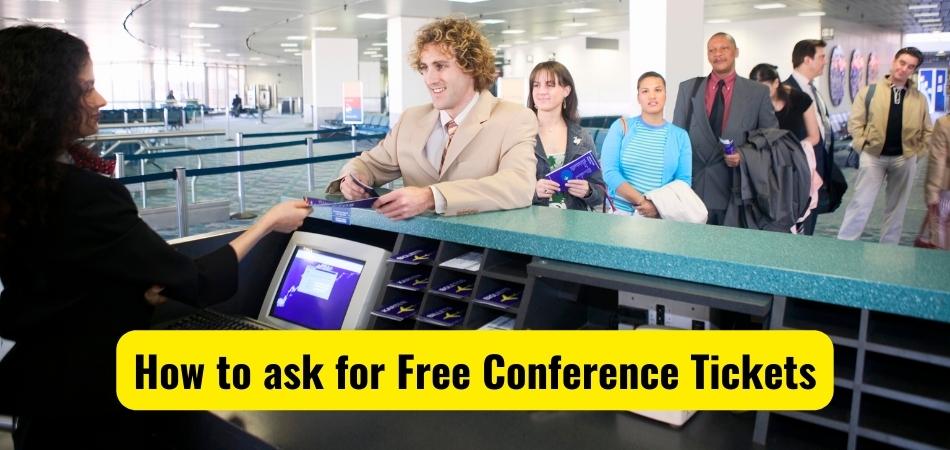Conferences offer invaluable opportunities for networking, learning, and getting introduced to new ideas, but the cost of attendance can be a problem. This brings us to the crucial question: “How to ask for free conference tickets?”
First, identify conferences that are of interest to you, then develop your value proposition to show organizers what you can offer, such as media coverage or volunteering. Communicate your interest directly with conference organizers. For additional options, consider media credentials and volunteer opportunities.
Are you curious about the different strategies for obtaining free tickets? If so, keep reading to discover all the necessary information on how to ask for free conference tickets and maximize your chances of attending valuable events.
Are the Conference Tickets Free?
Most conference tickets are not free; they usually cost something to cover event costs. This includes expenses such as venue rental, speaker fees, and materials. Attending a conference can be a valuable investment, but it’s important to budget for these costs ahead of time.
While most conferences require ticket purchases, there are ways to access free tickets. Some conferences offer free passes to specific groups, such as students, volunteers, or media professionals. Additionally, certain organizations provide sponsorships that include free admission for select attendees, making it essential to explore these options.
For those interested in getting free conference tickets, it’s helpful to network and seek out opportunities. Engaging with organizers, offering to volunteer, or inquiring about media passes can increase your chances of attending without paying. By being proactive and informed, you can enjoy the conference benefits while saving money.
How to ask for Free Conference Tickets?
There are many benefits to attending conferences, but the cost of tickets may be a concern. Understanding how to secure free tickets can enhance your professional development and provide opportunities for learning and networking without the financial burden.
Step 1: Identify the Right Conferences
Start by selecting conferences that align with your professional or academic interests. Research their themes, past events, and attendee feedback to get a clear understanding of what to expect. This step ensures you focus on events where your presence can have the most impact and benefit your career.
Step 2: Establish Your Value Proposition
Determine what unique value you can offer to the conference. This could include media coverage, expert talks, or volunteering your services. A strong value proposition makes you a desirable participant and shows the organizers why you should be granted a free ticket to attend.
Step 3: Reach Out to Organizers
Contact the conference organizers directly to express your interest in the event. Explain how you can contribute to the conference’s success. Be clear, concise, and professional in your communication to make a positive impression. A well-written message can greatly increase your chances of getting free tickets.
Step 4: Use Media Reputation
If you’re a blogger, podcaster, or journalist, use your media credentials to your advantage. Highlight your audience reach and visibility potential for the conference. Many conferences offer free passes to media professionals in exchange for publicity. This can also increase your chances of getting free items at conferences, as you may receive promotional materials during the event.
Step 5: Explore Volunteer Opportunities
Many conferences offer free entry in exchange for volunteer work. Find out about available volunteer roles and be ready to contribute your time and skills. This approach not only grants you access to the conference but also allows you to network and build relationships with other attendees.
Step 6: Apply for Scholarships or Funding
Look for scholarships or funding offered by the conference or related organizations. These are often available for students, academics, or professionals in specific fields. Be efficient in your applications and ensure you meet all the criteria to increase your chances of success.
Asking for free conference tickets involves careful planning and communication. By understanding your value and exploring your options, you increase your chances of attending valuable events without incurring financial burdens. Stay proactive to make the most of your opportunities.
Types of Conferences You Can Attend
There are numerous opportunities to learn, network, and grow professionally at conferences across various fields. Each type of conference caters to different interests and goals, providing valuable insights and connections that can improve your career and knowledge base.
Academic Conferences
Researchers, educators, and students benefit greatly from academic conferences. They provide a platform for presenting new research, receiving feedback, and engaging in scholarly discussions. These events foster collaboration and knowledge exchange, helping attendees stay updated on the latest academic developments and methodologies within their fields.
Industry Conferences
Professionals who want to keep up with trends and innovations should attend industry conferences. These events offer networking opportunities that can lead to partnerships and new business ventures. Attendees also benefit from practical workshops and sessions that provide valuable market insights.
Technology Conferences
Innovation and technology are showcased at technology conferences. These events are crucial for IT professionals, developers, and tech enthusiasts. Attendees experience hands-on demonstrations of new gadgets and software, while discussions on current tech trends provide valuable insights into the future of the industry.
Healthcare Conferences
The latest advances in medical science and treatment methods are discussed at healthcare conferences by medical professionals, researchers, and industry experts. These events are essential for staying updated in a dynamically developing field. Networking opportunities can lead to collaborative research and knowledge exchange that benefits both practitioners and patients.
Entrepreneurial Conferences
The purpose of entrepreneurial conferences is to benefit business owners, startups, and aspiring entrepreneurs. These events offer insights into business strategies, market trends, and innovative practices. Networking with investors, mentors, and fellow entrepreneurs can open doors to new opportunities, while workshops and talks provide practical advice for growing and maintaining a successful business.
Attending different types of conferences can greatly benefit your professional development. Each offers unique opportunities and experiences that contribute to personal and career development, making them valuable experiences for anyone looking to grow in their field.
What Factors Should You Consider When Deciding to Attend a Conference?
Planning and thinking carefully are essential when deciding to attend a conference. It’s essential to consider various factors that can impact your experience and professional growth. Understanding these aspects will help you make an informed choice about attending.
Purpose of Attendance
Before deciding to attend a conference, clarify your purpose for going. Are you looking to learn about new trends, network with industry leaders, or showcase your work? Understanding your objectives will help you determine if the conference aligns with your professional goals.
Costs Involved
A conference attendance cost should include all costs associated with registration, travel, lodging, and meals. Assess your budget and decide if the potential benefits justify the expenses. If the costs are high, you might need an excuse for not attending a conference that could be shared with your employer or peers.
Relevance of the Topics
Review the conference agenda and the topics being discussed. Ensure that the sessions and speakers are relevant to your field and interests. A conference that covers the latest industry trends or offers valuable workshops can be highly beneficial for your growth.
Networking Opportunities
Think about the potential networking opportunities available at the conference. Attending events where you can connect with peers, industry leaders, and potential collaborators can enhance your professional network. Weigh the importance of these connections against your reasons for considering not attending.
Timing and Availability
Check your schedule to see if the conference dates align with your commitments. Consider whether you can take time off work or manage your responsibilities while attending. If the timing is not right, it may be a valid reason to skip the event and focus on other priorities.
Deciding whether to attend a conference involves careful analysis of various factors. By analyzing your goals, costs, and schedule, you can make a choice that benefits your professional growth and ensures a valuable experience overall.
Tips to Get the Most Out of a Conference
Professional development, networking, and learning opportunities are all part of the conference experience. To maximize the benefits, a strategic approach is key. These tips will help you extract the most value from any conference you attend.
- Plan Your Schedule: Review the conference agenda in advance to identify the must-attend sessions. This planning ensures you don’t miss key talks or workshops relevant to your interests.
- Set Networking Goals: Identify people or companies you want to connect with. Having clear networking objectives makes your interactions more purposeful and productive.
- Engage Actively in Sessions: Participate in discussions and ask questions. Engaging with speakers and attendees fosters meaningful connections and enhances learning.
- Use Social Media: Share your experience and insights on social media using the conference hashtag. This increases your visibility and invites further networking opportunities.
- Take Notes: Write down key points and ideas from sessions. Note-taking helps in remembering information and serves as a useful reference after the conference.
- Follow-Up Post-Conference: Reach out to contacts you’ve made with a follow-up message or email. Timely follow-ups solidify connections and open doors to future collaborations.
- Reflect and Apply Learning: After the conference, reflect on the key takeaways and how to apply them to your work. Implementing new ideas and strategies can lead to significant professional growth.
It takes preparation, engagement, and follow-through to make the most of a conference. By following these tips, you can turn a conference experience into a catalyst for personal and professional development.
Frequently Asked Questions
Attending conferences can greatly improve your professional career, but ticket costs can be a barrier. Understanding how to effectively ask for free conference tickets can open doors to valuable learning and networking opportunities. Below are some frequently asked questions and answers to help guide you.
How Can I Offer My Services for a Free Ticket?
You can offer your services, such as speaking, moderating a panel, or assisting with event logistics, in exchange for a free ticket. Approach organizers with a clear proposal highlighting your skills and how they can benefit the event, making your request more appealing.
What Are Some Creative Ways to Secure Free Tickets?
Consider creating content like blog posts, videos, or podcasts that promote the conference. Offering to feature the event on your platform in exchange for a free ticket can be a creative way to show value to organizers, increasing your chances of success.
How Important Is Timing When Asking for Free Tickets?
Timing is crucial when asking for free tickets. Reach out to organizers well in advance of the event. Early requests show your genuine interest and allow organizers to consider your proposal before all tickets are sold, improving your chances of receiving a free pass.
Can Social Media Influence My Request for Free Tickets?
Yes, your social media presence can influence your request. If you have a significant following or engagement, use this to your advantage by offering to promote the conference. Demonstrating your reach can make you a more attractive candidate for a free ticket.
How Can Networking Help Me Get Free Conference Tickets?
The power of networking can help you secure free tickets. By building relationships with industry professionals and conference organizers, you increase your chances of receiving free passes. A strong network can provide opportunities that may not be advertised publicly.
Final Considerations
Securing free conference tickets can be a valuable opportunity for your professional growth. By offering your services, leveraging your social media presence, and timing your requests well, you can increase your chances of attending these events without the financial burden. These strategies provide a clear answer to the question, “How to ask for free conference tickets?” and help you take advantage of this opportunity.
Be innovative in your strategies, network effectively, and focus on showcasing your unique value. By following these tips, you’ll be well on your way to securing free tickets to the conferences that matter most to you. Best wishes on your adventure to expand your professional horizons!









Could attending a conference in the USA on a visa inadvertently open doors to other opportunities, such as networking events or job interviews, and does this extend the permissible period of stay beyond the conference dates? How do immigration laws interpret such extensions, and what precautions should one take to avoid visa violations?
Yes — you can attend a conference and also go to networking events or job interviews on a visitor visa (B1/B2). That’s usually allowed.
But it does NOT extend your stay. Your allowed stay is based on the date given at entry (your I-94), not the conference dates.
To avoid visa problems:
1. Do not work or accept pay from a U.S. company.
2. Do not overstay your I-94 date.
3. If you truly need more time, apply for an extension before your I-94 expires.